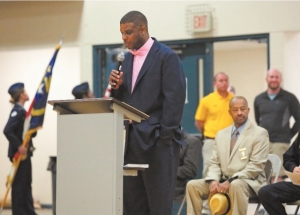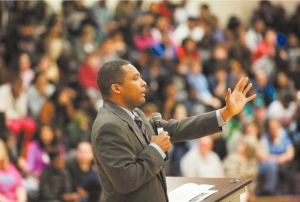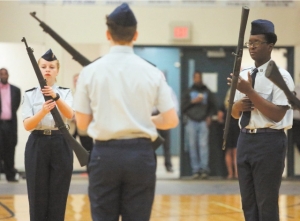Sen. Don Davis caps off Eastern Wayne's Black History Month events with speech
By Joey Pitchford
Published in News on February 25, 2018 3:05 AM

News-Argus/CASEY MOZINGO
Mark Colebrook speaks at the Black History Month assembly at Eastern Wayne High School after the presentation of the color and the national anthem.

News-Argus/CASEY MOZINGO
Senator Don Davis speaks during the Black History Month assembly at Eastern Wayne High School Friday. The assembly rounded off a week of activities for students.

News-Argus/CASEY MOZINGO
The Eastern Wayne High School Air Force JROTC drill team performs Friday during the Black History Month Assembly.
Eastern Wayne High School capped off a week of Black History Month events Friday, as students gathered in the school's main gym to listen to a speech from Sen. Don Davis.
Speaking to hundreds of students, Davis told the story of the Edmund Pettus Bridge, a bridge over the Alabama River where Civil Rights Movement demonstrators, protesting after the police killing of Jimmie Lee Jackson, crossed on March 7, 1965, as part of a march from Selma, Alabama to the capital of Montgomery.
As they approached the bridge, which was named after the former Grand Dragon of the Ku Klux Klan, they were confronted by state troopers and local possemen.
"The demonstrators showed up, and the troopers showed up, and the demonstrators prayed and began to cross Edmund Pettus Bridge," he said. "As they marched, the trooper, realizing that there was likely to be confrontation donned their tear gas masks. And then, as they moved forward, it was Maj. John Cloud who gave the order, and the troopers began to overtake the demonstrators. And before you know it, blood was spilled."
That day would later become known as Bloody Sunday, after the state troopers and county possemen attacked the unarmed marchers with tear gas and billy clubs, hospitalizing 17 of them and injuring 50 more.
Those demonstrators were marching for the eventual goal of attaining full access to the polls, Davis said, given that Alabama at the time enforced literacy tests and other barriers which made it nearly impossible for many black people to vote. The events of Bloody Sunday, televised across the nation, acted as a catalyst for further marches, and later for the historic Voting Rights Act, introduced into Congress March 15 of that year.
Davis asked the students to consider the dedication it must have taken for the demonstrators to face down certain harm, and told them to take advantage of the voting rights which the demonstrators fought for.
"At the time that these demonstrators came, they realized they were being confronted, and they were willing to take the risks. They were willing to go through that to fight for what they believed in, and that was for the ability of others to vote, not just them," he said. "Just imagine someone wanting something so bad that they are willing to go through what they experienced that day on March 7, 1965."
After his speech, Davis said that young people of all races need to get involved in the political process early.
"I believe it's important, especially for students, to begin to really think about issues, to learn about issues that are impacting us day-to-day, to register to vote, and more importantly to really engage in our community," he said. "That's a message that I think is important to all students, regardless of their race."
